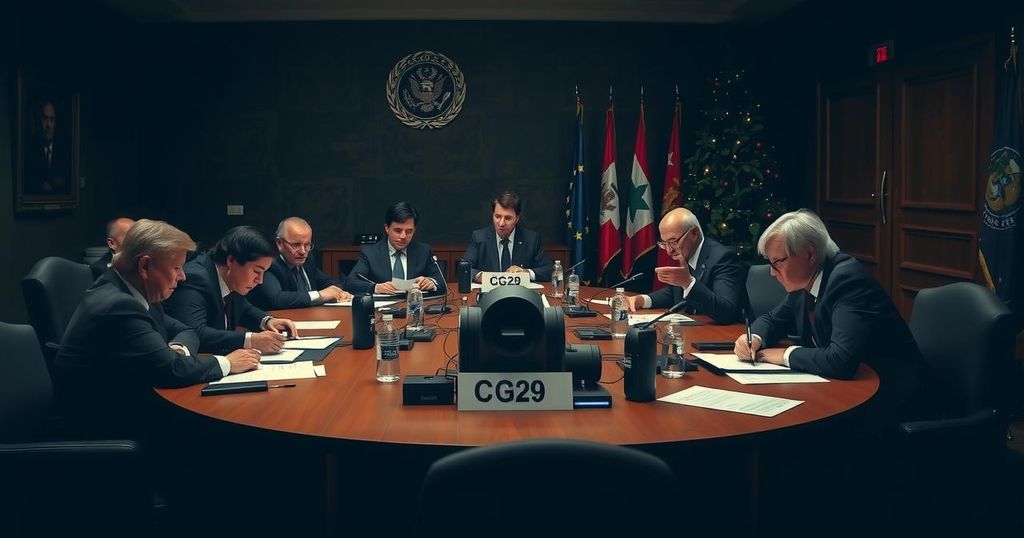COP29 Negotiators Seek Resolution on Climate Finance Following G20 Meeting

COP29 negotiators in Baku are striving to resolve financing disputes after the G20 summit recognized the need for significant climate funds for developing nations but left critical issues unresolved. With three days remaining, rich nations are urged to increase their financial commitments, yet disagreements over funding sources, amounts, and the transition from fossil fuels prevail, complicating negotiations.
Negotiators participating in COP29 in Baku are intensively working to overcome a stalemate at the UN climate talks, following the recent G20 meeting in Rio de Janeiro. The G20 acknowledged the pressing financial needs of developing nations but did not resolve critical issues impacting climate finance and the transition from fossil fuels. Amidst three days remaining in the conference, rich nations are urged to heighten their commitments currently set at $100 billion annually to support these nations in adapting to climate changes. However, substantial disagreements persist on funding details, including the sources and types of financing required. Key negotiators expressed that while the G20 declaration acknowledged the necessity of scaling up climate finance significantly, it lacked the specificity needed for a productive outcome. Yalchin Rafiyev, Azerbaijan’s lead negotiator, characterized the G20 statement as providing “positive signals” for the negotiations in Baku, while UN climate chief Simon Stiell emphasized the urgency for nations to bypass superficial discussions and reach consensus. Moreover, there is a sentiment that the G20’s absence of concrete commitments may hinder progress in Baku. Michai Robertson from the Alliance of Small Island States remarked on the insufficiency of the G20’s statements, implying that actionable leadership was expected but not delivered. Adonia Ayebare, chairman of the G77+China, voiced concerns regarding the framing of funding sources, stating that support should come strictly from public funds rather than loans. Negotiators also report that the talks are being affected by Saudi Arabia’s reluctance to acknowledge fossil fuel phase-out commitments made in previous conferences. European Union climate envoy Wopke Hoekstra highlighted the importance of adhering to the UAE consensus, asserting that the global community “cannot afford to backslide.” Further discussions will see the introduction of a new draft deal on climate finance by Wednesday night, with developing nations seeking a substantial annual financial commitment of $1.3 trillion. The convergence of various national interests and existing financial obligations complicate the pathway towards a cohesive agreement on both climate action and finance.
The COP29 discussions represent a critical juncture in international efforts to combat climate change, particularly for developing countries that heavily rely on financial aid to implement climate adaptation measures. The ongoing negotiations aim to finalize crucial agreements that transition economies away from fossil fuels towards more sustainable energy sources. With the backdrop of the recent G20 summit, negotiators in Baku are grappling with the implications of financial commitments, especially concerning the longstanding pledge of $100 billion by developed nations to support developing countries. This gathering highlights the tension between maintaining economic growth and ensuring environmental sustainability amidst global climate obligations.
In conclusion, the ongoing COP29 negotiations underline the urgent need for constructive dialogues among nations on climate finance and the transition from fossil fuels. Despite the G20’s acknowledgment of the significant financial needs of developing nations, the lack of concrete commitments has generated skepticism among negotiators about the potential for successful outcomes. The coming days are pivotal as negotiators seek to craft an agreement that adequately addresses the financial needs of developing countries while also setting a clear path toward sustainable energy solutions.
Original Source: www.france24.com






